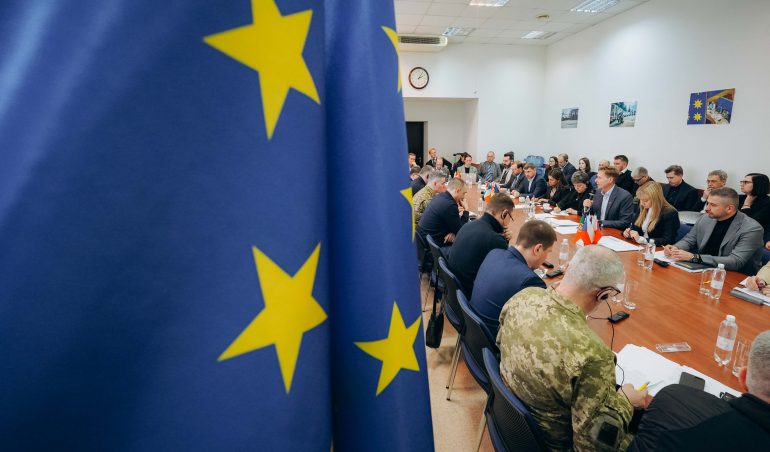The Second Meeting of the Law Enforcement Sectoral Working Group in Ukraine Held in Kyiv
February 20, 2025
The Law Enforcement Sectoral Working Group (LE SWG) serves as a platform for dialogue and coordination between Ukraine’s security sector institutions and international partners. It focuses on consolidating international efforts to support Ukraine in the context of Russia’s full-scale invasion as well as for the crucial reform processes in the civilian security sector to meet EU standards as part of the EU accession process, while also strengthening international cooperation for the long-term recovery and sustainable peace.
On 19 February 2025, the second meeting of the LE SWG was chaired by Kateryna Pavlichenko, Deputy Minister of Internal Affairs of Ukraine, and co-chaired by Rolf Holmboe, Head of European Union Advisory Mission in Ukraine (EUAM Ukraine), together with more than 50 representatives from international partners as well as representatives from the National Police of Ukraine (NPU), the National Guard of Ukraine (NGU), the State Bureau of Investigations (SBI), the Office of the Prosecutor General, the State Customs Service, the State Emergency Services of Ukraine (SESU) and other state institutions.
Deputy Minister of Internal Affairs Kateryna Pavlichenko expressed her gratitude to EUAM for its long-standing and effective cooperation and outlined key priorities included in the LE SWG’s Terms of Reference (TOR):
“The Sectoral Working Group on Law Enforcement will serve as an effective mechanism for implementing security sector reforms in partnership with our international allies. At the inaugural meeting, the Minister of Internal Affairs of Ukraine, Ihor Klymenko, outlined the Ministry’s strategic priorities. Based on these directions, we have developed the Terms of Reference for the SWG. This document reflects not only the challenges of wartime but also the prospects for post-war recovery. It will serve as a roadmap for attracting partner support, advancing ongoing and new initiatives, and shaping a modern security architecture for Ukraine.”
Rolf Holmboe, Head of EUAM Ukraine, reaffirmed the commitment of international partners to supporting Ukraine’s security sector:
“Our key priorities in the Sectoral Working Group on Law Enforcement include coordinating support for the operational needs of the Ministry of Internal Affairs and for the civilian security agencies as well as for the comprehensive reform process in the civilian security sector leading to EU accession, assisting in defining priority needs, fostering synergy among various donor initiatives, and ensuring effective coordination to avoid overlaps in the international assistance to Ukraine.”
The partners discussed the TOR developed by MoIA for the work of the LE SWG, incorporating proposals from the State Bureau of Investigations (SBI), the National Guard of Ukraine (NGU), and the State Migration Service (SMS) as well as from the United Nations Development Programme (UNDP). The TOR were endorsed but will be finalized with the additional proposals in a silence procedure. Participants agreed on a work plan schedule until the end of 2025 and also considered an initial overview of the existing international partner efforts in the civilian security sector.
Deputy Minister Kateryna Pavlichenko emphasised the need for effective and results-oriented work in the LE SWG and proposed four thematic subgroups to focus on four strategic directions: (1) enhancing the emergency response, (2) combating crime and ensuring public safety, (3) border security and migration, and (4) reconstruction – recovery – accessibility. The subgroups would bring together Ukrainian and international partners working specifically in these areas for more detailed discussions. The subgroups would commence their work immediately and will remain open to partners engaged in or considering engaging in these respective areas. Further subgroups may also be considered.
The partners agreed to the thematic subgroups and to the proposals for the Ukrainian chairs of the subgroups as well as to the initial proposals for the international co-chairs. The partners endorsed some of the immediate priorities outlined by Deputy Minister Kateryna Pavlichenko:
- Civil protection
- Modernizing warning systems
- Organizing evacuations in frontline areas
- Documenting war crimes
- Stabilization measures in de-occupied territories
- Ensuring a safe educational environment
- Countering the illicit circulation of weapons
- Fighting crime and drug trafficking
- Developing protective structures, demining, and border security
- Addressing migration issues
- Enhancing cybersecurity
- Rehabilitation of military personnel and implementation of an effective veteran policy within the MoIA.














